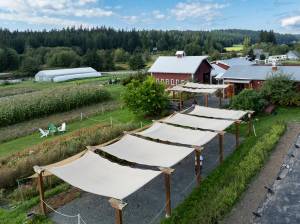Scottish Highland cattle gain popularity with Washington hobby farmers
Published 10:22 pm Sunday, June 8, 2008
ELMA — Sometimes people stop to stare at the cattle grazing on Bob and Doris Swalander’s Elma farmstead. Sometimes they ask if the shaggy animals are yaks. They’re not. They’re Scottish Highland cattle.
There aren’t too many of the specialty breed in Grays Harbor County; only a handful of small-herd breeders are in operation. Of the roughly 10,000 livestock, including about 5,000 dairy cows, in Grays Harbor County, fewer than 100 are Highland cattle. But their numbers are growing.
“It validates the enormous diversity of Grays Harbor County,” said Don Tapio, WSU Extension agent for the county. “Livestock continue to be an important part of our ag industry.”
For the most part, the county’s livestock aren’t visible from the highways, but are tucked away throughout the county’s valleys are a variety of exotic breeds, including buffalo, that are raised for meat production, Tapio said. The Highland cattle operations are a part of that growing trend, he said.
The Swalanders have nine animals after birthing two calves this spring on their 10-acre spread. Five of their acres are covered with fir trees, but the Highlanders, unlike other cattle breeds, are browsers and forage in the trees just fine. The breed’s suitability to a small hobby farmer is what attracted Bob.
“You can’t making a living at it as a small operator. Maybe further down the road, we’ll see,” he said. Instead, Swalander continues with his day job at a Tacoma telephone company and raises the Highlanders mostly as a hobby. There is an increasing demand for the low-fat, grass-fed meat from a breed that requires less hands-on management. That’s part of the reason the breed is becoming popular.
“Every product has its sales pitch,” said Cheryl Kammerzell, president of the Northwest Highland Cattle Association. “They are a breed that live up to their sales pitch.”
She and her husband, Tom, raise the cattle on their 80-acre Maple K ranch in Colfax in Eastern Washington. The association has about 80 member farms in Washington, Oregon, Idaho and British Columbia. Western Washington boasts more Highland breeders because the breed tends to be well-suited to the smaller acreages and hobby farmers there, Kammerzell said.
About 70 association members visited Grays Harbor County in April for the annual spring membership meeting. Each year it’s held at a different farm. This year, Tom and Deanna Newton of Bitterroot Farms near McCleary hosted.
The Newtons have nearly three dozen cattle on their secluded 84-acre spread. The couple started with a small herd in Graham but relocated here five years ago because the county had relatively inexpensive land and numerous resources available to the small farmer, Tom Newton said.
Highland owners tend to be small owners; many are part-time gentleman farmers who may not have any farming experience, he said. Like Bob Swalander, Tom Newton keeps his day job as a financial adviser with an Edward Jones office in Tacoma.
“That gives me the money to play at this hobby,” Newton said.
Mostly he sells to breeders, but also has the steers slaughtered for boutique beef sales. He touts the low-fat quality of the beef. Because the animals have thick hair, they have less fat on their bodies.
The association can play an important role as a marketing agent for the breed, as was done for the Black Angus breed, to spread the word about its unique qualities, Newton said.
“We want to promote value to the consumer,” he said.
Newton’s pride in his herd is evident as he tramps up a hillside, a pipe clamped in his mouth, to visit his prize bull, Big Sky, and lead cow, Jasmine. Because the Newtons’ animals are registered, they all must have names. All the animals are docile and accustomed to his presence. Had he brought a comb, they would have been nosing in for a visit, Newton said. As it was, they stood still or ambled away as the mood struck.
“They won’t hurt you with those big horns, but you do have to be mindful,” he said. “If they turn, they can bump you.”
Newton plans to show some of his herd this summer at the Grays Harbor County Fair. This year is the first in which the fair will allow the exhibition of the breed in a separate category. Highlands previously could compete only in the open class against cattle of other breeds.




